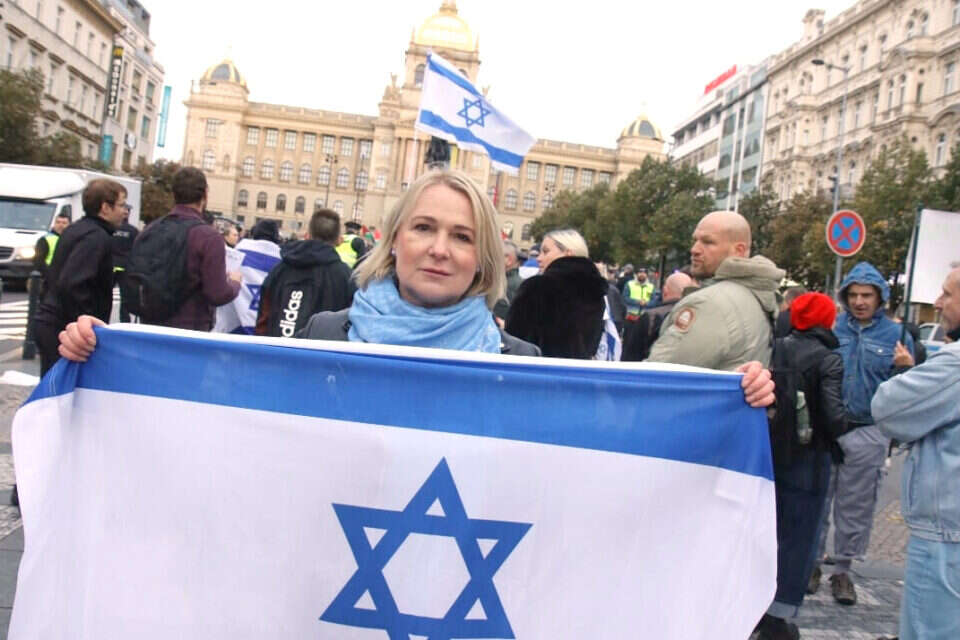In the wake of the war, and against the background of the rise of anti-Semitism in many countries around the world, the Czech Republic suddenly revealed itself to the Israeli public as an enthusiastic supporter of Israel. The Czech foreign minister was the first minister to arrive in Israel for a solidarity visit, the Czech prime minister came to speak at a rally in support of Israel in Prague's Old Town Square, the Czech defense minister called for a withdrawal from the UN due to the organization's inability to condemn terrorist acts, and parliamentarians were photographed in a group photo with pictures of the abductees. On many government buildings, Israeli flags were hung as a sign of support and solidarity.
Why has the Czech Republic become Israel's biggest supporter of the European Union? Although Czech love of Israel has reached the public consciousness following recent events, in fact there is a long legacy in the Czech Republic of identification with the Jewish people, some would say hundreds of years old. Even during the religious wars of the late Middle Ages, which intensified pogroms in Central Europe, many Czechs rejected classical anti-Semitism motivated there by the Catholic Church, which was identified with foreign powers.
But in fact, what contributed most of all to changing the attitude of the Czechs towards the Jews and turning many of them into philo-Semites (lovers of Jews) was the first president of Czechoslovakia, Tomáš Grieg Masaryk.
Masaryk (1937-1850), who testified that he grew up in an anti-Semitic home, saw the eradication of anti-Semitism as a national goal for the rebirth of his people. Even as a young politician, and against political logic, he fought against a blood libel that took place during the period of Austrian rule in his country, and became an unofficial friend of Czech Jews.
At the same time, he saw that in addition to the Czech people, the Jewish people suffered even more from political oppression in the Austro-Hungarian Empire, understood the Jews' need for a state of their own, and thus became one of the first Zionist heads of state.
After being elected president, Masaryk built his country as a state that allowed freedom to all peoples living in it, and gave the Jews the status of a nation and not just a religion. Even as president, he continued to fight anti-Semitism, believing, like Herzl, that the key to this was self-determination. In 1927, while serving as president, he visited Israel and met the Yishuv and his countrymen in Jerusalem, Tel Aviv and the north.
Even after his death, Masaryk's pro-Zionist legacy led to the overwhelming assistance of Czechoslovakia during the War of Independence. While during the war an arms embargo was imposed on Israel by various countries, Czechoslovakia was the only country that agreed to sell arms to Israel. His son, Jan Masaryk, who was foreign minister at the time, even forged the sales documents of the "Czech rifle" in order to outsmart the ban on arms sales, and when the weapons arrived in Israel, Operation Nachshon began to lift the siege on Jerusalem. The Israeli Air Force was based on the first fighter squadrons received from Czechoslovakia. The IDF's first paratrooper course was also held on Czechoslovak soil, under the command of Haim Guri.
During the religious wars of the late Middle Ages, which intensified pogroms in Central Europe, many Czechs rejected classical anti-Semitism motivated there by the Catholic Church, which was identified with foreign powers
With the deepening of Communist rule, there was a sharp shift in Czechoslovakia's attitude toward Israel and the Jews. This has caused great embarrassment among today's Czechs, who are trying to shake off the old regime and turn towards political renewal in order to be part of the democratic and Western order. With the liberation of the country from communism, the president of Czechoslovakia saw the renewal of relations with Israel as part of the democratization process of the country, and even came to Israel for a political visit. It seems that since then, Czech politics and people have become more philosophical than ever, and interest in Israel and Judaism continues to occupy a place in the public discourse in the country.
In fact, the outburst of Czech support for Israel is not a spontaneous event, but an inseparable part of the local culture and mood. The reports show that anti-Semitic incidents in the country are negligible, and the future looks even brighter as many Israelis discover the beautiful face of the Czechs.
Wrong? We'll fix it! If you find a mistake in the article, please share with us

